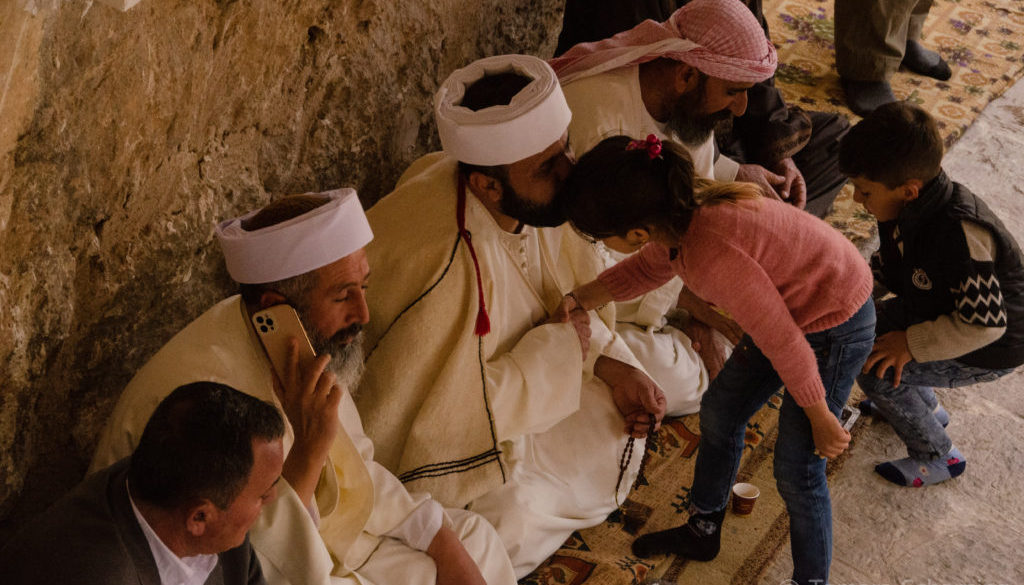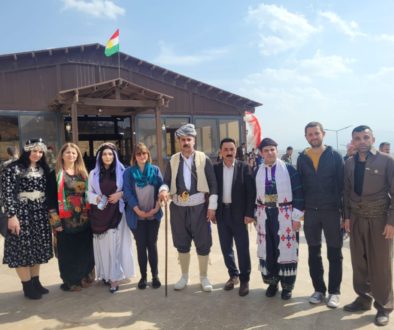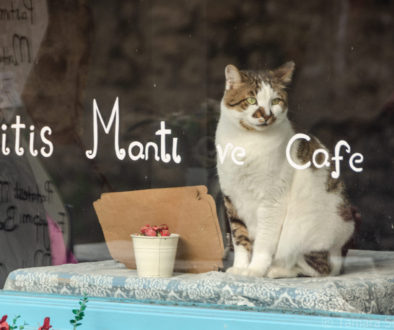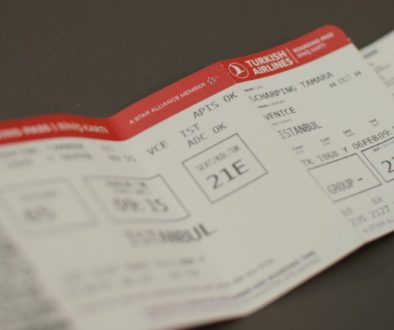For any trip to Iraqi Kurdistan, a visit to Lalish is a must. It is the spiritual centre of the Yezedis, a religious minority that has experienced countless persecutions throughout its history as they are said to have suffered no less than 70 genocides. The most recent was in 2017 when Daech killed more than 5,000 people, mostly women and children. We went there on a Friday, a holy day, when the place is bustling with activity.
The taxi ride from Dohuk took about 40 minutes. As soon as we got out of our vehicle, a group of 4 young men approached us. One of them speaks fluent English and asks us if we want to have lunch with them and their family, after which they offer to show us around. We had been warned that this kind of offer was common, so we accept with enthusiasm.
We follow our hosts towards the “village”. But before entering, we are told that we have to take off our shoes. Shoes are indeed forbidden. So we continue in our socks.
We walk through some cobbled streets and quickly see the characteristic conical roofs of the place, then arrive at a small covered courtyard where a burgundy carpet has been unrolled. We are invited to take a seat next to a dozen members of their family, all male, the women being busy preparing lunch.

Faisal is the only one who speaks English. He works for an NGO in charge of managing refugees in Sinjur, a town in the far north of Iraq but outside Kurdistan. This is an opportunity to learn more about this little known religion and community. In 2014, there were still 650,000 of them living in the north of Iraq, but many fled the arrival of Daech and took refuge in Turkey, Europe, the USA or the countries of the former USSR. Faisal also lived in exile for five years. He decided to return to his home town of Sinjar, even though the situation there remains difficult, especially because of attacks by the Turkish army. Some of his relatives still live in refugee camps in difficult conditions.
Yezedism is a monotheistic religion that dates back to the 3rd century BC. They believe in one God who represents the principle of Good and Evil. Some Christians and Muslims accuse the Yezedis of being devil worshippers, which is the source of their persecution.
After an hour, the meal is served. We want to contribute with the few bread cakes and bananas we had brought for lunch, but soon realise that they are no match for the picnic planned by our hosts. Within moments, gargantuan quantities of rice, grilled chicken, mutton stew and raw vegetables cover the carpet. We begin to understand the saying that “the greatest danger in Kurdistan is overeating”… The women will eat separately, because of the lack of space.



When the meal is over, Faisal and his family invite us to visit the village. The place is full of believers, Friday being the holy day. Very quickly, we have the impression that we are not dressed appropriately, as everyone around us is dressed elegantly, many in traditional clothes.


Some come from the region and are here regularly, others are here for a baptism, and others even come from the four corners of the world. In principle, every Yezedi should come once in his life on a pilgrimage to Lalish. A little girl of about 8 years old spontaneously approaches us in English to explain that she is here for the first time. She lives in Australia. A little later, a man in his thirties who has heard us speak German engages the conversation in that language. He has been living in Germany for 10 years and came to Lalish today for the baptism of his son.
It is a very closed religion. You cannot become a Yezedi, you are if your parents are. Marriage outside the community is forbidden. Anyone who marries a person of another religion is immediately excommunicated.
Suddenly, there is a lot of movement not far from us. A man with a long black beard advances, drawing a crowd in his wake. This man is the Baba-Shayk, the spiritual leader of the Yezedis and the only inhabitant of Lalish. Many believers approach him to kiss his hand, but he is also very available for photo opportunities, including with children and tourists.
Many temples are scattered throughout the village. We are told that we have to step over the door frame and not to walk on it. We want to follow Faisal in one of the temples but the guard makes us understand that we can’t go any further. Only the Yezedis have the right to enter.
The devotion of the Yezedis is impressive. Everywhere around us, men and women are in line to enter the temples and kiss the sacred objects. We try, in a discreet and respectful way, to immortalise these moments. We are also regularly asked to pose for photos with the locals.






At around 5pm, we regretfully have to end our visit to take the way back home. As there is no taxi, we hitchhike back and want to arrive before the sunset. The warmth of the welcome and the good mood of the Yezedis would almost have made us forget the atrocities suffered by their community only a few years ago.













